
November 23, 2011
Postcards from Portfoliopolis
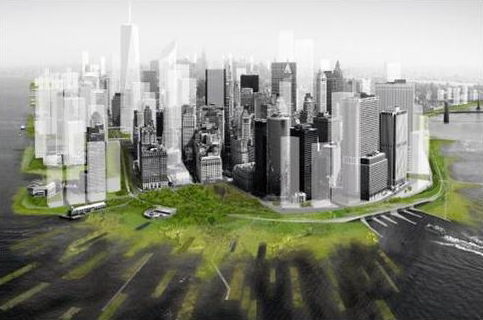
Proposed climate-change-ready Lower Manhattan.
You’d think that after three major moves in the span of six years, I’d prefer to stay in one place for the foreseeable future. And you’d be right. But I’d still pack my bags tomorrow if I could figure out how to become a citizen of Portfoliopolis.

Proposed Paris: “What modern city wouldn’t benefit from more green space, cleaner waterways, or more accessible public transit?”
Portfoliopolis is, in a word, ideal. It’s urban and walkable, convenient yet sustainable. The inhabitants are content and fit and statistically diverse; they jog, walk hand-in-hand, stroll in business suits and casual-wear; enjoy their dogs and their children.

Proposed BIKE center would hold 690 bikes in former parking garage.
Why wouldn’t they be happy? They move through an environment consisting of nothing but “design solutions.” A parking garage converted into a bike storage facility. A supermarket that’s part of a “sustainable community complex” (including not just shops but “ adaptable housing for senior citizens”). A light-rail line with “pedestrian friendly developments” clustered around its stations, providing “a catalyst for positive change in the community.”
Even the suburbs of Portfoliopolis seduce:

Proposed “Entrepreneurbia,” turning “residential neighborhoods into entrepreneurial incubators.”
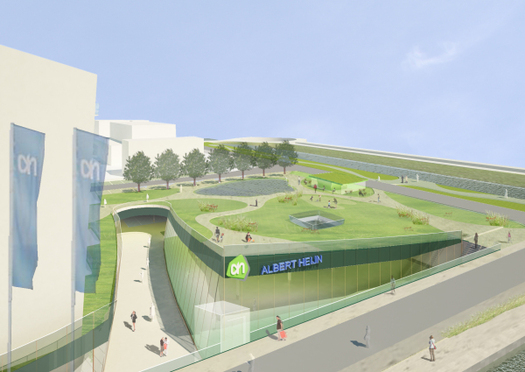
Proposed supermarket/sustainable community complex.
Those are random examples, of course. Portfoliopis sprawls across mental landscapes with no boundaries and no limits whatsoever. Greenspace is everywhere; former vacant blocks become “archipleagos of opportunity;” ecology is ever maximized, responsible and on a human scale. Citizens collaborate in reshaping robust urban infrastructure for the benefit of all. The sun always shines, and the grass could not possibly be any greener.
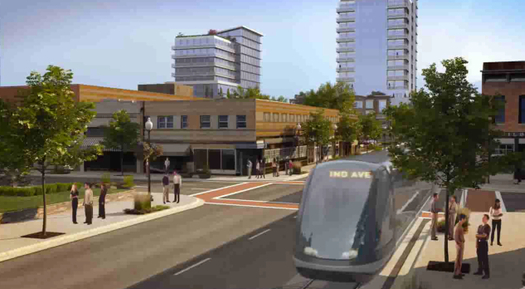
Proposed transit solution.
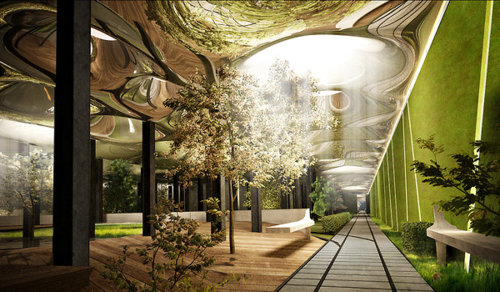
The proposed Low Line, via A Bit Late.
The political structure of Portfoliopolis is unclear, but one assumes it manifests principally via “charette.” (At the least, it’s a place where every citizen knows what a charette is.) No litter mars the streets or sidewalks of Portfolioplis, nor are there public protests. I can’t recall spotting evidence of graffiti, razorwire, blight, or traffic. Nobody smokes in Portfoliopolis. Nobody panhandles, either. As far as I can tell, there is no need for law enforcement there, or at least none that’s visible.
I’ve begun to collect the postcards from Portfoliopolis that pile up in designworld, winning contests and filling exhibitions and blogs — and of course portfolios — with their seductive visions. Judging by the proliferation of the evidence, it’s a place that grows faster than any 21st Century mega-city — but always “smart”-ly, neatly anticipating environmental catastrophe and never beset by the ad-hoc peripheral slums so familiar to us here on Earth.
The road to Portfolioplis, I imagine (and obviously I can only imagine) is paved with the creative solutions. It is designworld’s El Dorado, constructed, or perhaps I should say fabricated, from the best of intentions. It often draws its power from the clean grid of potential career advancement, the ultimate renewable resource.
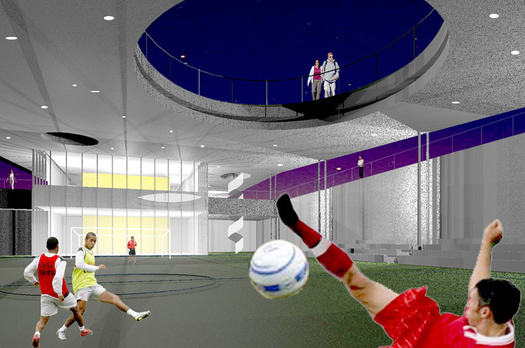
Proposed (existing?) ingeniuos sports complex.
Visitors to Portfoliopolis send back messages that can be difficult to decipher. “A sports complex,” one dispatch reports, “increases the amount of usable space by simply elevating one end of the park.” Does this exist somewhere in physical space? Will it some day? Where will it be — besides Portfoliopolis, I mean? Answers can be elusive.
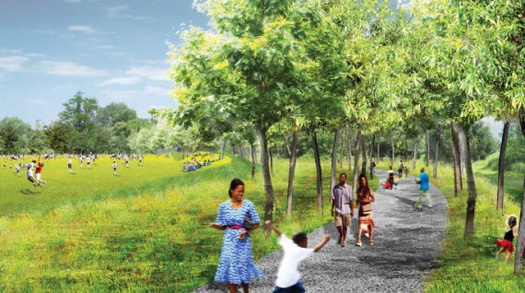
How smart growth may be enjoyed.
From time to time, however, something from Portfolioplis does manifest in the middle (or on the fringes) of more familiar geography, some three-dimensional place where people not unlike you and me live, work, litter, and worry about getting laid off tomorrow. There’s always something uncanny about these structures and spaces. They never look quite like the postcard. The surroundings, the context, are all wrong. And the citizenry suddenly seem so … specific.
I find this perversely reassuring. I’ve visited The High Line, and frankly found it indistinguishable from Portfolioplis to a degree that unnerved me. A visitor moves through such spaces cautiously, half-expecting that it is all mirage — but wondering just the same if might contain, possibly, some kind of portal, some secret passageway to Porfolioplis itself.

How one planned community, and its residents, could look.
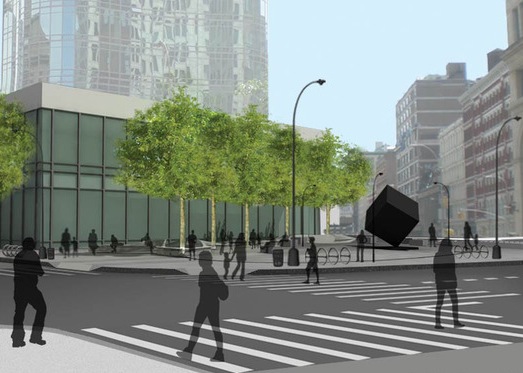
How Astor Place, and area pedestrians, could look.
Portfoliopolis seems so promising, but of course it’s nothing of the kind. Postcards from Portfoliopolis never promise: Instead they suggest, they inspire, they beguile, and they distract. Portfolioplis is truly a place apart. In fact, it’s plausible that the only reason it’s fun to to imagine living there is that I know, for certain, that I can’t.
Observed
View all
Observed
By Rob Walker
Related Posts

AI Observer
Lee Moreau|Critique
The Wizards of AI are sad and lonely men

Business
Louisa Eunice|Essays
The afterlife of souvenirs: what survives between culture and commerce?
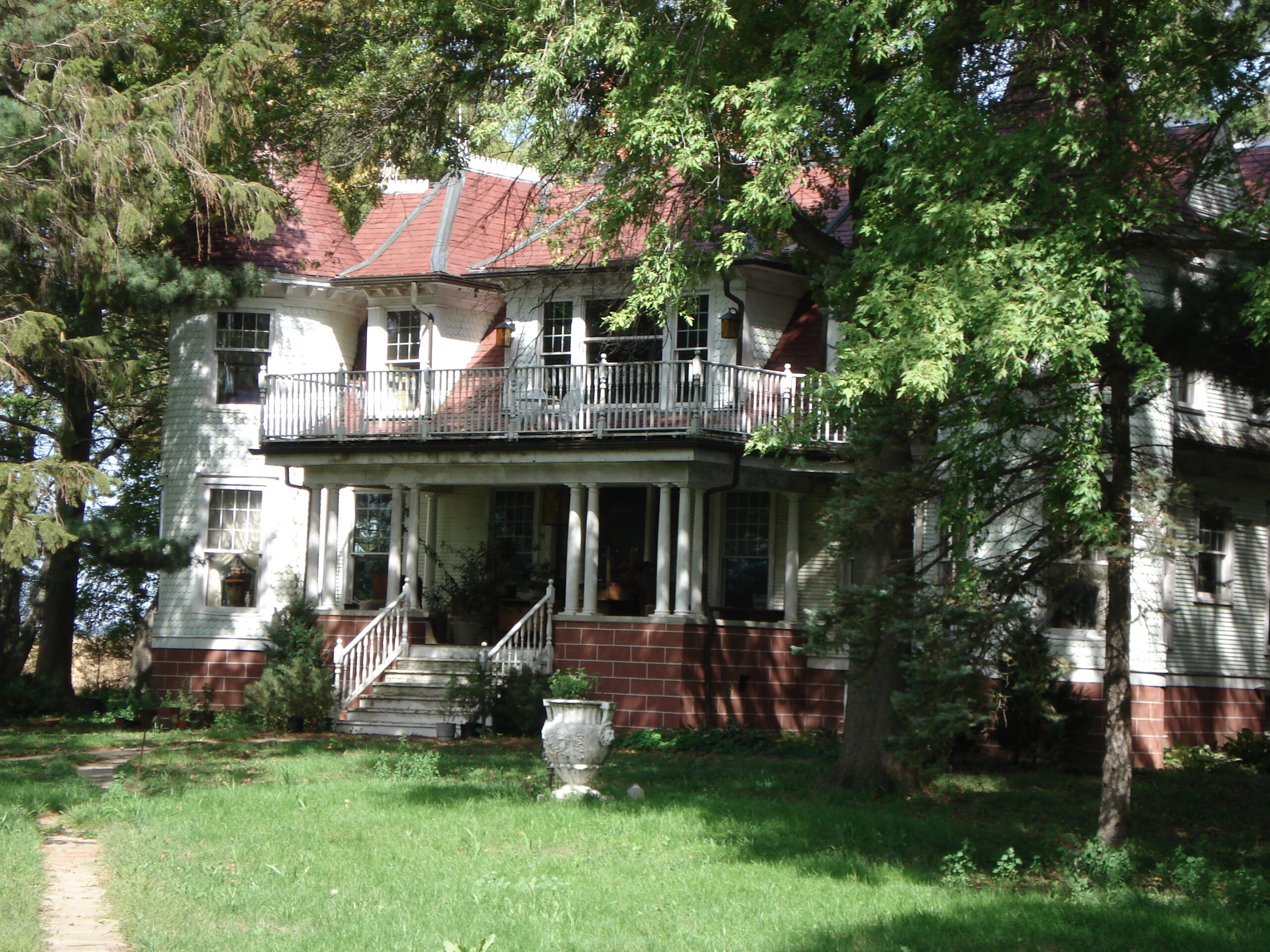
Architecture
Bruce Miller|Essays
A haunting on the prairie

Arts + Culture
Yahia Lababidi|Essays
‘The museum-going cannibal:’ On Francis Bacon
Related Posts

AI Observer
Lee Moreau|Critique
The Wizards of AI are sad and lonely men

Business
Louisa Eunice|Essays
The afterlife of souvenirs: what survives between culture and commerce?

Architecture
Bruce Miller|Essays
A haunting on the prairie

Arts + Culture
Yahia Lababidi|Essays

 Rob Walker is a technology/culture columnist for
Rob Walker is a technology/culture columnist for